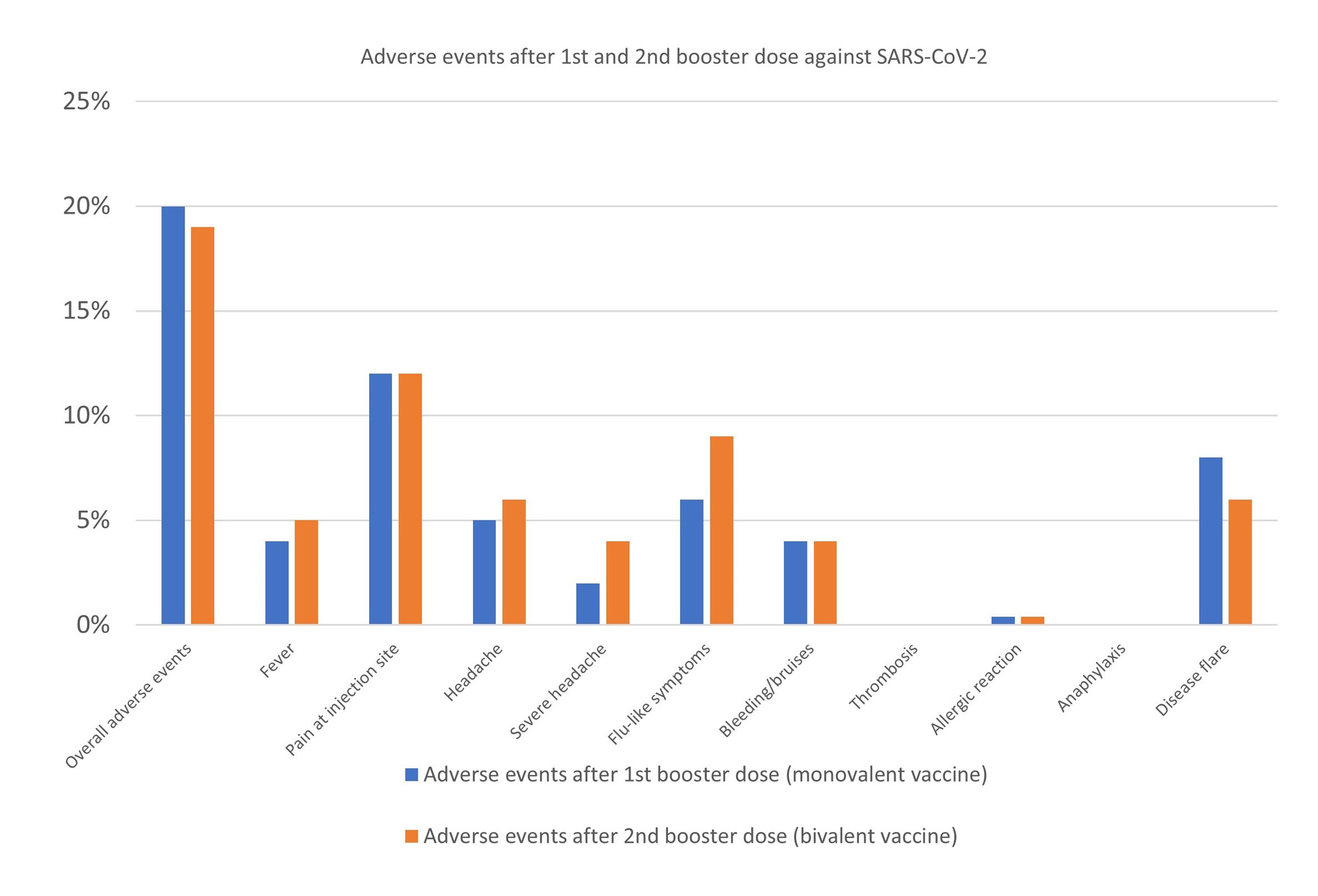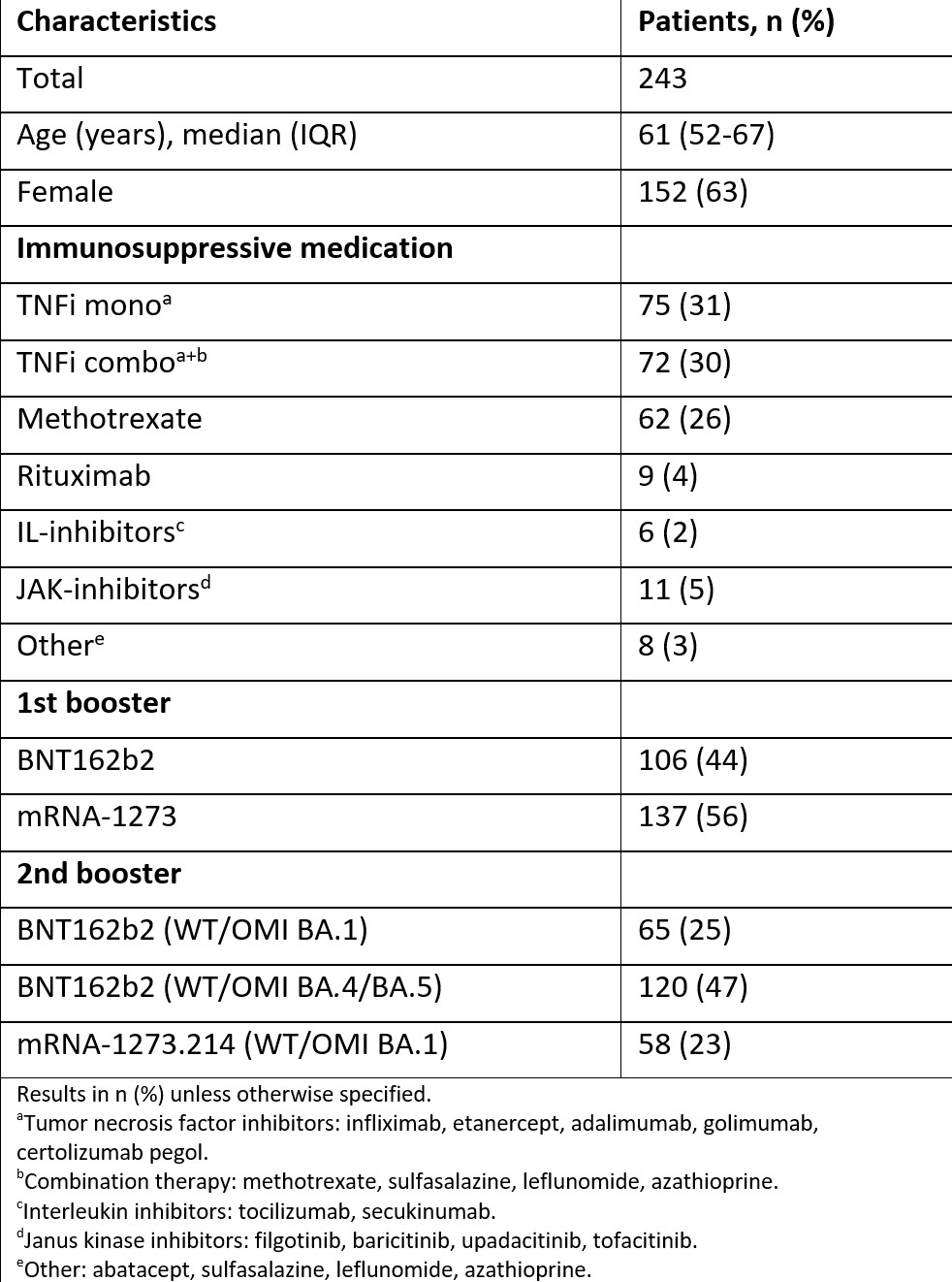Session Information
Session Type: Poster Session A
Session Time: 9:00AM-11:00AM
Background/Purpose: Safety and efficacy of updated bivalent vaccines, containing both the original vaccine variant of SARS-CoV-2 Spike and either Omicron variants BA.1 or BA.4/5, are of particular interest in arthritis patients on immunosuppressive therapies. With the continuous emergence of new viral variants, it is important to evaluate whether updated vaccines induce more adverse events in this patient group. The objective of this study was examine if a second booster dose with updated bivalent vaccine increases the risk of adverse events, compared to the first booster dose with monovalent vaccines.
Methods: The prospective Nor-vaC study investigates vaccine responses in patients with immune mediated inflammatory diseases using immunosuppressive therapies (1). The present analyses included arthritis patients who received two booster doses. Patients received available vaccines according to the Norwegian vaccination program. The current recommendation in the Norwegian arthritis population is a three-dose primary vaccination series followed by two booster doses. Adverse events following vaccines doses were self-reported through questionnaires. Adverse events following the first (monovalent) and second (bivalent) booster were compared with McNemar’s test.
Results: Between 7th of July 2021 and 6th of December 2022 a total of 243 arthritis patients (127 rheumatoid arthritis, 65 psoriatic arthritis, 51 spondyloarthritis) on immunosuppressive therapies (Table) received a first, monovalent (BNT162b2, mRNA-1273) and a second, bivalent booster dose (BNT162b2 (WT/OMI BA.1), mRNA-1273.214, BNT162b2 (WT/OMI BA.4/BA.5)). Adverse events were recorded within two weeks in all patients (Figure). In total, 45 vs 49 (19% vs 20 %) patients reported any adverse event after a second, bivalent booster dose, compared to the first, monovalent booster, respectively. There was no significant difference in adverse events overall (p= 0.57). The most common adverse events after the second booster were pain at injection site (12 %), flu-like symptoms (9 %) and headache (6 %). No new safety signals emerged. A total of 15 (6 %) patients reported a disease flare after receiving the second, bivalent booster, compared to 21 (8 %) after the first, monovalent booster.
Conclusion: There was no difference in adverse events between the monovalent, first booster, and the bivalent, second booster, indicating that bivalent vaccines are safe in this patient group.
Reference:
1. Syversen S.W. et al Arthritis Rheumatol 2022
To cite this abstract in AMA style:
Ørbo H, Jyssum I, Tveter A, Christensen I, Sexton J, Bjørlykke K, Kro G, Kvien T, Grødeland G, Munthe L, Mjaaland S, Vaage J, Haavardsholm E, Jørgensen K, Provan S, Syversen S, Goll G. Safety of Bivalent SARS-CoV-2 Vaccines as a Second Booster Dose in Arthritis Patients on Immunosuppressive Therapies [abstract]. Arthritis Rheumatol. 2023; 75 (suppl 9). https://acrabstracts.org/abstract/safety-of-bivalent-sars-cov-2-vaccines-as-a-second-booster-dose-in-arthritis-patients-on-immunosuppressive-therapies/. Accessed .« Back to ACR Convergence 2023
ACR Meeting Abstracts - https://acrabstracts.org/abstract/safety-of-bivalent-sars-cov-2-vaccines-as-a-second-booster-dose-in-arthritis-patients-on-immunosuppressive-therapies/


